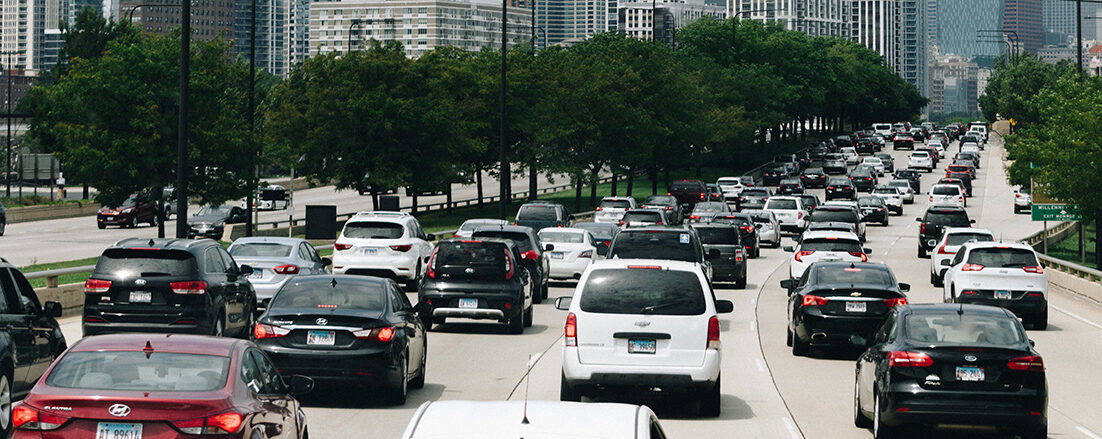Think about the last time you were in traffic. It makes us late, and it impacts our health. It sucks to be stuck “in traffic.” But think about it another way. What if we started to say, “we are traffic?” What if, instead of traffic happening to us, we recognized our presence was contributing to it? We’d have more empathy for other people who were also traffic, and we’d start to think about ways to solve the problem.
We often think of things happening to us instead of happening to the world. When we flip the script, we orient ourselves toward empathy, problem solving, and altruism. When we see ourselves as actors in the world, we become the architects of the world instead of passive actors. What if we did this with climate change?
Shifting How We View Climate Change
Many call it the problem of the twenty-first century. Climatic changes are occurring and are well-documented by climate scientists—more frequent and stronger storms, an ever earlier wildfire season, increasing rainfall in some areas and less in others.1 According to the National Climate Assessment, a bi-partisan report required by law every four years, the only explanation for these changes is human activity adding carbon dioxide and methane into the atmosphere at higher rates than ever before. We are just scratching the surface of the long-term effects unless we act with the time we have left.
I hear the scoffs. “Act? What action can I possibly take when the climate is so large and I am one person?” In teaching and working to mitigate climate change, this is the question I get most often. I used to list the actions we can take: LED light bulbs, hybrid cars, home insulation, investment in renewable energy, vote, eat lower on the food chain, or bike or walk to work. While all of these are great steps, I recently realized that the issue is not that people are unsure of the solutions. While there are nuances, many of us know that America’s lifestyle greatly contributes to greenhouse gas emissions. The reality is that people feel hopeless that their actions will make an impact. We know we’ve fouled our own nest, but we don’t think we can clean it up.
We are hopeless because we’ve been too focused on ourselves. We’ve bought a version of individualism that mistakes personal gain for personal strength. We think that our actions, no matter their merit or deprivation, don’t truly matter. We’ve traded our social connections and positive leisure for personalized screens, insatiable consumption, and thinking that we are right and others are wrong. By questioning an individual’s action to solve climate change, we forget that our individual actions collectively degraded the atmosphere. The most fascinating thing about our hyper-individualized selves is that we’ve forgotten the truth of what truly makes us happy—altruism, hope, and our common identity.
Looking Out for Others
Happiness is challenging to understand, and while we hold the pursuit of it to be self-evident, we don’t always get that pursuit right. However hard it is to quantify, scholars have begun to understand more fully what happiness in a modern society looks like. In the World Happiness Report, researchers discovered that the things that contribute most to human wellbeing are environmental quality, security, and social connections.2 Not surprisingly, the opposite of these things are among the leading causes of a country’s lower happiness ranking, and a commitment to altruism is woven through all major happiness scores.
This shouldn’t surprise the community of faith. Paul reminds the church, “Do not merely look out for your own personal interests, but also for the interests of others.” (Philippians 4:2) This biblical reminder is one that our ancestors remembered during times of crisis.
During World War II, when the fear of German aggression on American shores was at its height, households and businesses on both coasts turned off their lights and closed their shops early to limit visible targets for German aircraft. In the midst of the current global pandemic, people share meals with those in need and support frontline workers. Even the natural world, which we misunderstand as exclusively survival of the fittest, operates with altruism. Trees are known to cooperate and take collective action when experiencing the stress of storms, pests, and disease. Forests do not survive hundreds of years by solely competing with each other. These times of great crisis lead to great collective action and hope.3
Collective Action Can Bring Hope
Collective action is needed to stave off the worst challenges of climate change— food insecurity, rising sea levels, more dangerous storms, etc. The solutions to these problems are certainly dependent on technology and policy, but the collective action we must do as a society is work of the heart. We must recognize our hopelessness and lack of altruism as the traffic jam for work that must happen.
I am hopeful about our ability to address climate change because we have great examples and great teachings that show us we can respond to crisis. I am also hopeful because of how collective action has already started. Most of us agree about the solutions to climate change more than we think (increased renewables, electric vehicle infrastructure, keeping our air and water clean).4
But to enact these changes, we must remember the words of Paul, the altruistic work of nature, and those architects of hope during crises. I am hopeful because when we see ourselves as architects of the world we want, we empower ourselves and each other to actually create that world.
Notes:
- Katherine Hayhoe, et al., 2018: “Our Changing Climate,” in Impacts, Risks, and Adaptation in the United States: Fourth National Climate Assessment, Vol. II. (Washington, DC: US Global Change Research Program), 72–144.
- R. Kaplan, The Nature of the View from Home: Psychological Benefits. Environment and Behavior, 33, no. 4 (2001): 507–542; John F. Helliwell, et al., eds. World Happiness Report 2020 (New York: Sustainable Development Solutions Network, 2020).
- P. Wohlleben, The Hidden Life of Trees: What They Feel, How They communicate—Discoveries from a secret world (Vancouver, BC: Greystone Books, 2016).
- The Yale Climate Communications project shows that Americans agree on climate solutions more than they disagree about the reality of climate change.
This article was originally published in the Fall 2020 issue of Shalom! A Journal for the Practice of Reconciliation.


